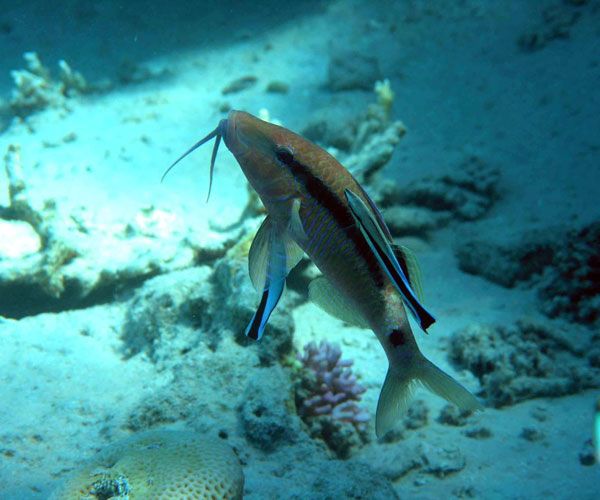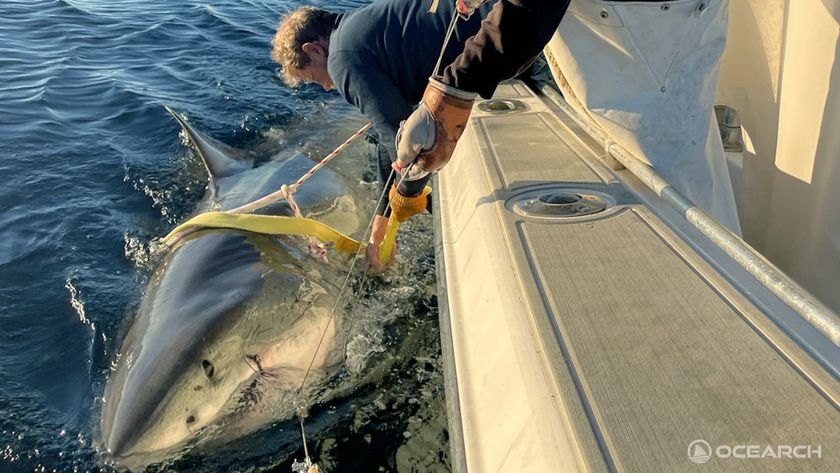Massages Relax Fish Too

Massages don't just relax people; fish may also enjoy the stress-relieving benefits of a rubdown, a new study shows.
In the wild, coral reef-dwelling surgeonfish get a massage from the cleaner fish that usually picks parasites off their skin. Now, scientists have shown that surgeonfish that receive these massages actually have lower levels of a stress-related hormone, cortisol, in their blood.
There's evidence that touch has health benefits for a number of animal species, including humans, other primates and rats, but this study provides the first evidence touch can be good for fish. It also reveals a new dimension to the relationship between the surgeonfish and the cleaner fish.
Clients and cleaners
Surgeonfish go to specific sites, known as cleaning stations, where they strike a pose to invite the cleaners to get to work. The cleaners do their job of removing parasites, but sometimes, they cheat and eat some of the surgeonfish's protective mucus coat. The cleaners actually prefer this meal, but the surgeonfish want to keep their mucus for themselves, so conflict can arise. [Photos: Unlikely Animal Friends]
To make up for cheating, and for other reasons, such as to build a relationship with a new client, cleaner fish will straddle the back of a surgeonfish, using its pelvic and pectoral fins to massage the surgeonfish. Until now, scientists didn't think the surgeonfish received any real benefit from the massage, according to Marta Soares, the lead researcher of the new study finding the massages lower surgeonfish stress, and a postdoctoral researcher with Instituto Superior de Psicologia Aplicada in Portugal and the Université de Neuchâtel in Switzerland.
To eliminate the possibility that other factors, such as social interaction or parasite removal, might have some effect, the researchers used fake cleaner fish resembling bluestreak cleaner wrasses. Some of these fake cleaners moved, offering massages with a soft brush on their ventral side, or stomach, while others were stationary.
Sign up for the Live Science daily newsletter now
Get the world’s most fascinating discoveries delivered straight to your inbox.
Stress test
Surgeonfish collected from around the Great Barrier Reef near Australia were given access to one of these types of model cleaners for two hours per day for 10 days. Then, on the 11th day, the researchers took blood samples from the fish to measure levels of cortisol, a hormone associated with stress.
Among humans, long-term stress, and subsequent overexposure to cortisol and other stress hormones, puts a person at increased risk of heart disease, obesity, depression and other problems, according to the Mayo Clinic.
In the fish study, researchers found that the fish that received massages from the models had lower cortisol levels than those with access to only stationary models.
During a second part of the experiment, after being exposed to the model cleaners, the surgeonfish were confined in a bucket, a stressful event of them. All confined fish experienced elevated stress, but among those that had been massaged by the fake cleaner fish, the longer those massages, the lower their cortisol.
The researchers compared the massages' effects on the surgeonfish to those seen in humans who receive them from strangers with whom they have no social connection.
"This revealed that physical contact, without any social factor, is enough to produce positive, short-term physiological effects in fish, a phenomenon so far demonstrated only in humans," they write in a study published today (Nov. 15) in the journal Nature Communications.
You can follow LiveScience senior writer Wynne Parry on Twitter @Wynne_Parry. Follow LiveScience for the latest in science news and discoveries on Twitter @livescience and on Facebook.
Most Popular




